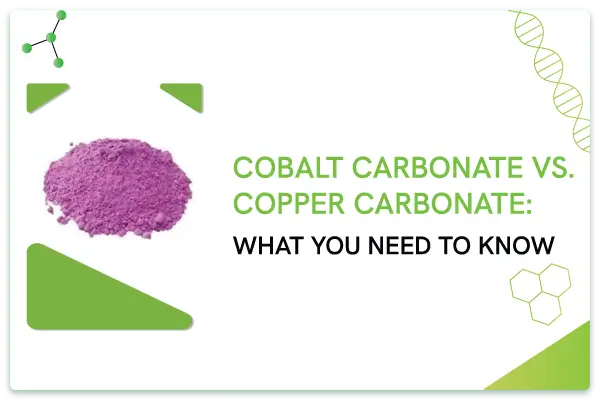What is Cobalt Carbonate?

Cobalt Carbonate (CoCO₃) and Copper Carbonate (CuCO₃)are two essential inorganic compounds used in various industrial applications. Both carbonates are widely recognized for their unique properties, including their role in pigment production, ceramics, glass manufacturing, and agriculture. At Muqeet Marketing, we supply high-quality Cobalt Carbonate and Copper Carbonate, meeting stringent industry standards to support different manufacturing and processing needs. Understanding the differences between these two compounds and their applications can help businesses make informed decisions regarding their use.
Cobalt Carbonate is a blue-green inorganic compound widely used in industrial and chemical applications. It is commonly employed as a precursor in the production of cobalt pigments, ceramics, and specialized chemicals. Due to its excellent stability and color properties, Cobalt Carbonate is also used in glass production and electronic components. Another crucial application is in animal nutrition, where cobalt is an essential trace element for livestock health and metabolism.
What is Copper Carbonate?
Copper Carbonate is a greenish-blue compound known for its significant role in pigments, coatings, and ceramics. It is widely used in paints, glass manufacturing, and fungicides due to its superior color stability and antimicrobial properties. Copper Carbonate is also applied in agriculture as a nutrient additive for plant health, helping to prevent copper deficiency in crops. Its versatility in industrial and environmental applications makes it a valuable material for different sectors.
Key Applications of Cobalt Carbonate
Pigment Production
Cobalt Carbonate is a crucial component in cobalt-based pigments used in paints, inks, and industrial coatings. Its strong resistance to UV radiation and environmental factors makes it ideal for high-performance coatings.
Ceramics and Glass Industry
As a coloring agent in ceramics, Cobalt Carbonate enhances the depth and brilliance of blue hues in pottery, tiles, and glass products. It is widely preferred for its thermal stability and long-lasting color effects.
Chemical Synthesis
Cobalt Carbonate serves as a precursor for various cobalt compounds, including cobalt oxide and cobalt chloride, which are used in catalysts, metal plating, and electronic components.
Electronics Manufacturing
The conductive properties of cobalt make Cobalt Carbonate useful in semiconductors, rechargeable batteries, and superalloys required for advanced electronic devices.
Animal Nutrition
Cobalt is an essential trace mineral required for ruminant animals, playing a key role in vitamin B12 synthesis, which improves metabolism, digestion, and overall livestock health.
Key Applications of Copper Carbonate
Pigments and Coatings
Copper Carbonate is widely used in paints, varnishes, and coatings to produce vibrant green and blue colors. It offers high durability, UV protection, and chemical resistance, making it a valuable material for artistic and industrial applications.
Ceramics and Glass Manufacturing
As a coloring agent in ceramic glazes, Copper Carbonate produces deep green and turquoise shades in pottery, tiles, and decorative ceramics. It is also used in glass production to create rich, transparent green hues.
Agriculture and Fungicides
Copper Carbonate is widely used in fungicides and pesticides due to its antimicrobial and antifungal properties. It helps control fungal diseases in crops and provides an essential copper nutrient for plant health.
Chemical and Metal Processing
Copper Carbonate is used in catalysis, metal finishing, and electroplating industries. It serves as a precursor for copper-based chemicals, essential in chemical synthesis and industrial applications.
Comparing Cobalt Carbonate and Copper Carbonate
Both Cobalt Carbonate and Copper Carbonate are valuable industrial materials, but they serve different purposes based on their chemical properties, stability, and industrial demand. Cobalt Carbonate is primarily used for ceramics, electronics, and animal nutrition, while Copper Carbonate is extensively used in coatings, agriculture, and glass manufacturing.
Key Differences
- Color Contribution: Cobalt Carbonate produces blue hues, while Copper Carbonate results in greenish-blue colors.
- Industrial Usage: Cobalt Carbonate is commonly used in electronic components and batteries, whereas Copper Carbonate is frequently used in agricultural fungicides.
- Nutritional Value: Cobalt Carbonate is essential for livestock health, while Copper Carbonate is beneficial for plant growth.
Why Choose Muqeet Marketing?
At Muqeet Marketing, we take pride in being a trusted supplier of Cobalt Carbonate and Copper Carbonate, delivering high-quality chemical solutions to industries worldwide. Our commitment to product purity, consistent supply, and competitive pricing makes us the preferred choice for manufacturers and businesses. With extensive experience and a reliable distribution network, we cater to ceramic manufacturers, chemical industries, agricultural companies, and electronics producers. We ensure that our clients receive the best-quality materials for their specific industrial and commercial needs.
Conclusion
Both Cobalt Carbonate and Copper Carbonate are vital compounds in various industries, including ceramics, pigments, agriculture, and electronics. While Cobalt Carbonate is predominantly used in chemical synthesis, electronics, and animal nutrition, Copper Carbonate finds applications in coatings, fungicides, and glass production. Understanding the differences between these compounds allows businesses to select the most suitable material for their specific manufacturing processes.
For more information about Cobalt Carbonate and Copper Carbonate, call us at +91 9825115698 or email us at muqeetmarketing@yahoo.com Let Muqeet Marketing be your trusted partner in high-quality chemical solutions for industrial success.

